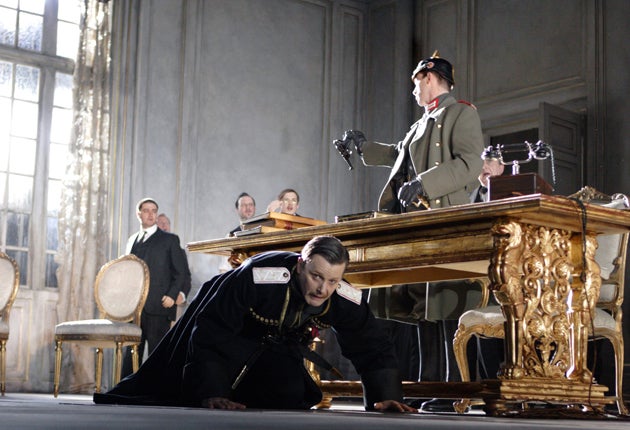The White Guard, National Theatre, London
Where 'Allo 'Allo meets Chekhov

Mikhail Bulgakov is one of the great contrarian spirits of world drama and, despite everything that pernicious censorship could do to break him, a master at imposing tragicomic shape on moral and political chaos.
The White Guard (1926) is a play that richly illustrates these gifts and it's revived now in a trenchantly acted, brilliantly designed and spiritually uplifting production by Howard Davies in the Lyttelton.
Set in Kiev in 1918-1919, during the post-revolutionary Russian civil war, it explores the plight of the Turbins, a family of Tsarist supporters, as they struggle to react to a situation of bewildering political changeability and – if you are trying to juggle loyalty to the past with pragmatic prudence about a projected future – intractable difficulty. Kiev is in the hands of the Germans who have appointed a puppet government, but the Ukrainian nationalists are bombarding the town and the Bolsheviks are expected imminently.
Davies's production exerts a seemingly effortless control over the play's clashing moods. There are sequences that put you in mind of a sort of thinking person's 'Allo, 'Allo, as when the German stooge-dictactor does a bunk disguised as a stretcher case, bandaged like the Invisible Man but spiked helmet and hectoring manner still stubbornly in place. There are moments that crystallise the casual, utilitarian brutality of civil war, as when a commander off-handedly shoots a deserter because his frostbitten feet would mean the waste of a hospital bed.
Andrew Upton's translation, with its recourse to slangy words like "wonky" even in passages of delicate emotion, is designed to make us feel more like contemporaries of these people than time-travelling cultural tourists. Though if one were offered a trip in the Tardis, it would be seriously fascinating to touch down during one of the many performances in the Moscow Art Theatre that were watched by the play's number-one fan and Bulgakov's key oppressor, Josef Stalin.
The piece has a supple and – in the scenes of hospitable family dinners and troubled toasts – near-Chekhovian humanity. In the course of the play, Justine Mitchell's beautifully pained yet humorous Elena, is deserted for safe German exile by her pompous creep of a husband; she loses a beloved brother (Daniel Flynn) who is killed just after he has made the agonising decision to disband the White Guard because of the violent futility of the military situation; and she's beset by a host of pushy suitors. Conleth Hill brings his wonderful gift for mixing portly camp with flickering sensitivity to the role of the worldly, self-important aide to the scarpering German puppet governor. And Pip Carter delightfully twangs the heartstrings and tickles the ribs as the family's lovelorn, klutzy, student-cousin.
In rep to 15 June (020 7452 3000)
Subscribe to Independent Premium to bookmark this article
Want to bookmark your favourite articles and stories to read or reference later? Start your Independent Premium subscription today.

Join our commenting forum
Join thought-provoking conversations, follow other Independent readers and see their replies